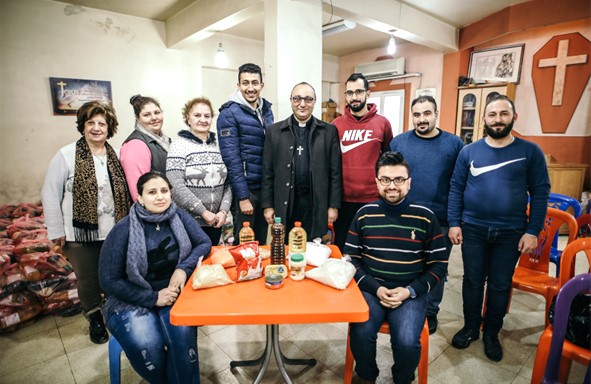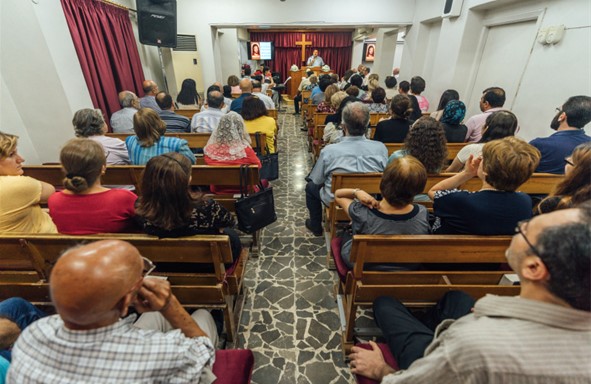Thomas (name changed) oversees the work of Open Doors in the Middle East. In this interview, he reflects on the seven-year Hope for the Middle East campaign – what it has achieved so far, what is still to come, and the future of Open Doors’ work in the region.
How did Hope for the Middle East begin?
Thomas: As the crisis in Syria escalated, and during the rise of so-called Islamic State in Iraq, there was a clear plea from church leaders to come alongside them. We brought a team together, including external experts. I asked them what the biggest issue was, and the answer was “Hope. The church and society need hope.”
"We are convinced that the only hope is through the church, because Jesus is the Hope."
The church, for centuries, has been the hope bringer. We are convinced that the only hope is through the church, because Jesus is the Hope. We looked at the very dramatic situation in Syria and Iraq, and we felt that we needed to strengthen the church.
We listened to the church and what they wanted us to say, to influence international communities and governments. The answer was a multi-layered campaign that had an important advocacy part – and emergency relief.
What has the campaign advocated for?
Thomas: The most public highlight happened in December 2017, when a petition signed by over 800,000 people from 143 different countries on behalf of our brothers and sisters in Syria and Iraq was handed over to the United Nations in New York. Behind the scenes, we also advocated for flexible-funding opportunities – and, as a result, saw changes that make it possible for faith-based organisations to receive international support.
Your prayers, advocacy and awareness efforts put the plight of Christians in the Middle East ‘on the radar’. In the beginning, people were not aware of this vibrant Christian community in Syria and Iraq – they thought the Middle East is Muslim.
 Open Doors and Christians from Iraq presented the Hope for Middle East petition to the United Nations in 2017
Open Doors and Christians from Iraq presented the Hope for Middle East petition to the United Nations in 2017
That’s why I think that the concept of the church as a Centre of Hope, which developed out of Hope for the Middle East, is embraced not just by supporters but also by governments, who acknowledge more and more the important role of the church. Even the governments in Syria and Iraq see that they play an important role in reviving civil society.
How did Centres of Hope develop?
Thomas: We came across leaders with vision amid horror. Pastors and priests said, “Despite everything, let me be the Nehemiah to rebuild the walls and the temple.” They inspired us; they were already practising the Centre of Hope idea. They created conditions for families to return and to rebuild.
This is where the idea was born: churches as a place where people receive hope again. Sometimes that through prayer and pastoral counselling, sometimes through the church providing biblical teaching on suffering and pain and faith. It could be a church as a place for young people, or churches that work with women, with widows, with men or giving informal teaching to children. Or a church where needy people receive a food package. Our church partners have already distributed one million food packages in Syria.
"We started with a goal of 60 Centres of Hope in Syria, and we now have 160."
We started with a goal of 60 Centres of Hope in Syria, and we now have 160. In Iraq, we have 126 churches designated as Centres of Hope. We don’t come and do relief and then leave. We build relationships with the churches, and we stay. We get to know each other at a ‘heart and faith’ level.
People really appreciate our ongoing and spiritual presence. A bishop said to me, “You are the oxygen in our lungs.” They thank us because we stood with them for many years. Our role as Open Doors is to ‘strengthen what remains’ (Revelation 3:2), so that the witness continues. I see this happening through our livelihood projects. We are bringing something much deeper than a regular NGO.
 Volunteers at a Centre of Hope in Syria
Volunteers at a Centre of Hope in Syria
 A church service in Aleppo, Syria
A church service in Aleppo, Syria
What is the future of the church in the Middle East?
Thomas: I know for sure that our work has contributed to people staying. The church has become smaller, but it is still vibrant. People in Syria are desperate, especially now with the economic crisis and lack of light at the end of the tunnel. But our efforts have increased the resilience of the Christians.
I’ve been saying, “We will continue to pray with you, to put a hand on your shoulder, to listen to you.” All our teams continue to say that.
We strongly believe that the role of the church will remain. God will keep his remnant. The church was born in the Middle East, and the church will be there to convey the love of God to the Muslims. Through Centres of Hope, they discover that Jesus gives hope.
"We strongly believe that the role of the church will remain. God will keep his remnant."
I was speechless when I walked into a church service with only believers from a Muslim background from Syria. They all went through war, killings, their conversion, being expelled from their families. They were sitting there with a serenity and a calmness, worshipping the Lord and hearing from the Bible, and I knew that this place was a Centre of Hope for them. It is the work of the Holy Spirit, and we do a tiny little bit.
As we remain faithful to the Christians in Iraq and Syria, we will grow the number of Centres of Hope and deepen the work with the existing Centres of Hope. We cannot let them down; the Hope for the Middle East campaign comes to an end, but we continue to invest in Centres of Hope in the middle of hopelessness. Don’t give up. Let hope last.
Please Pray
Father God, thank You for the hope that You are bringing to the Middle East. Please equip local partners to serve their churches and communities still further. Bring the light of Christ into dark places, give unity to all who serve You in the Middle East, and protect our courageous church family. As Thomas prays, may hope last in Syria and Iraq. Amen.
Please Give
- Every HK$290 could supply vital food, winter clothing and blankets to a Christian in Syria this winter.
- Every HK$400 could enable two vulnerable believers to access basic medical services.
- Every HK$510 could provide trauma support and counselling to a believer attending a retreat.




 Open Doors and Christians from Iraq presented the Hope for Middle East petition to the United Nations in 2017
Open Doors and Christians from Iraq presented the Hope for Middle East petition to the United Nations in 2017 Volunteers at a Centre of Hope in Syria
Volunteers at a Centre of Hope in Syria A church service in Aleppo, Syria
A church service in Aleppo, Syria